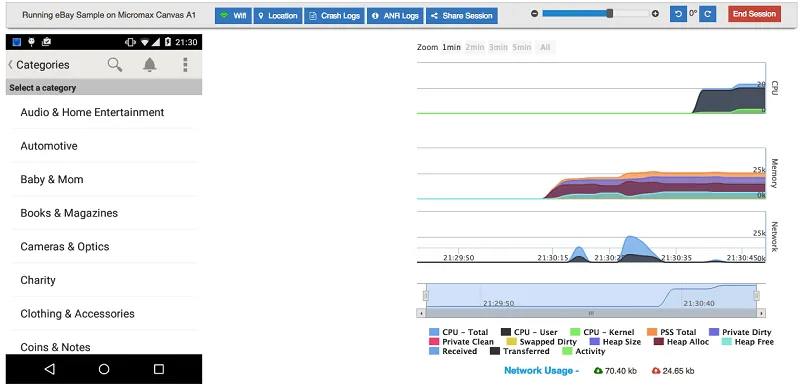Counting nodes as growth metrics, how this startup plans to build a single platform for app testing in India
9 Billion Smartphone users (in 2016), 200 Million number of apps downloaded (2015) and over 1500 Crore revenue from paid apps (2015). Staggering numbers that paint a promising picture of how the app economy is shaping up.
Sweating to create a niche in this crowded space is RobusTest. Founded in December, 2014, the co-founders Om Narayan and Aishwarya Mishra, met in the software testing department at Pramati Technologies. Om approached things from a tool development perspective while Aishwarya was responsible for the business and user experience side of things. With a hint of sarcasm, Aishwarya tells us how they believed their complementary (work) relationship could create magic.

Bootstrapped on Om’s savings (of 10-15 lakhs), their reason to start the venture was ‘sheer frustration’. Aishwarya tells us more:
Usually a mobile application is tested on multiple devices. There is frustration around buying mobile devices, maintaining them using log registers, and then swapping them on our systems for development. Add to this, the unnecessary distraction of dealing with more than 40 devices and still feeling unsure about how our app is going to perform on the users’ mobiles.
RobusTest is a one stop platform for an app publisher to test their app. It enables manual testing of apps using just your browser, automating test cases for your mobile apps without writing codes, running automated tests in parallel, and providing app performance insights on real mobile device interfaces.
What does this mean? This means that the app publishers don’t have to maintain multiple devices. They can get easy access to these devices, wherever and whenever, without physically having to carry them. Moreover, they can share interface sessions with their own mobile devices to enhance the real-time usage experience of the app.
This is the third product by the startup, with the earlier ones being Chrome Extensions for bug management and web application testing. Launched in May, 2015, currently, the solution has 15 different device interfaces. The solution, of course, has different revenue models for each interface.
Revenue Model
When a user signs up for RobusTest on their website, they receive 60 minutes of free device hours to test the various offerings. After 60 minutes, the solution goes into ‘Pay as you go’ mode where the user has to pay five US dollars for every device hour. At this point of time the venture is focussing on the enterprise model (their B2B model) to create their brand presence. Aishwarya also explains that their B2C model would require a much bigger public cloud, for which they’d be requiring greater investments. Under the enterprise model, the solution provides two options. The first option is ‘Hosted’ - where a firm can use RobusTest on public cloud at a price of Rs.3,00,000 for 10 devices, every month. In case the count increases to more than 10 devices, the firm charges an additional Rs. 30,000 per device.
Yet again, there might be a few firms who may not be comfortable to test their applications on public cloud. For them, the firm offers the second option: an ‘On-Premise’ model where the entire platform (including hardware) is setup at the client’s office. This works on an annual licencing basis, where the client pays Rs.60,00,000 per year. Some discounts are available, depending upon the engagement.
The startup is yet to establish its growth metrics; or rather, as they define it, ‘the one metric that matters’. Being non-mainstream, the founders feel that the important metrics are, perhaps, centred round the number of nodes installed (each node supports 10 devices).

Prospective Plans
In another six months, RobusTest plans to create a crowd-sourcing testing model. They intend to make the forum live by the end of August, 2015. This platform will be a community where developers can hire testers on project basis. RobusTest will act as the outsourcing platform, with the revenues being shared between RobusTest and the application tester.
If one follows Gartner’s report, 75 per cent of innovation and R&D capabilities for more than half of the consumer goods manufacturers will come through crowd-sourcing.
Currently, the venture is in talks with major players in the telecom and financial data domain - assisting them in pilot projects. They are also working with vendors in the enterprise messaging space. Their prospective clients fall broadly into two categories: those who have mobile app(s) to service their customers, and those who use mobile apps to ensure their operations are responsive to today’s needs.
Learnings
If getting their first customers is a challenge for RobusTest, their second challenge is to get capital. The startup plans to initiate efforts for fundraising by August-end or September, 2015. Aishwarya tells us about a third big challenge:
Creating an end-to-end product is definitely a challenge. Owing to the dynamicity of the industry, we always have to customise our solutions and offerings in the market to match up to the expectations of the customers. This is what we strive to do every day.
Their experiences don’t stop there. The co-founders share how every day is a ‘mixed bag of emotions’ for them – a low, frustration or satisfaction. They believe that a product is not a set of features or technologies hashed together. Rather, it is supposed to solve a problem and provide user experience.
Here are some words of wisdom from them:
Our suggestion is, while developing a product one should ask oneself a couple of questions: ‘Who is the product for’, and ‘What problem of theirs is it solving'. Answering these go a long way in deciding if a feature should exist, and even if it does, does it have to be put in now. Such things matter a lot, especially, for a bootstrapped startup where resources are scarce but the need to create an impact is just as much.
So far, in 2015, the mobile startup industry closed as many as 39 deals with an investment value of almost USD 519 million. This not just creates a booming market for app testers like RobusTest, but also is a marker showing that this segment is far from saturation.







